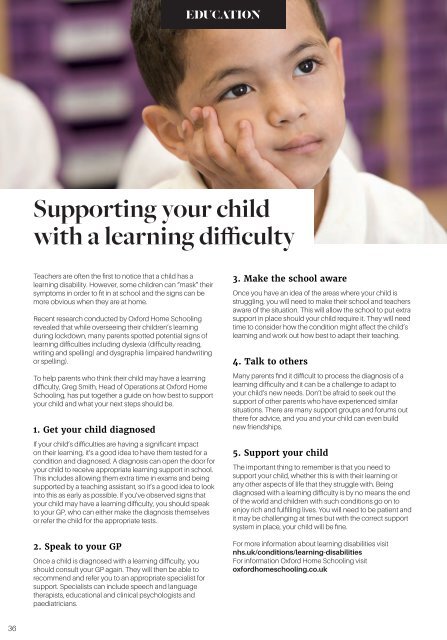East Life Winter 2022
It’s the most wonderful time of the year! A time to eat, drink and be merry, to don your best outfit and head out to some of the many fantastic places in our region. Restaurants, theatres, adventure parks, churches and market squares across the east will transform into magical winter wonderlands. There’s no such thing as too much sparkle… not now.
It’s the most wonderful time of the year!
A time to eat, drink and be merry, to don your best outfit and head out to some of the many fantastic places in our region. Restaurants, theatres, adventure parks, churches and market squares across the east will transform into magical winter wonderlands. There’s no such thing as too much sparkle… not now.
Create successful ePaper yourself
Turn your PDF publications into a flip-book with our unique Google optimized e-Paper software.
Supporting your child<br />
with a learning difficulty<br />
Teachers are often the first to notice that a child has a<br />
learning disability. However, some children can “mask” their<br />
symptoms in order to fit in at school and the signs can be<br />
more obvious when they are at home.<br />
Recent research conducted by Oxford Home Schooling<br />
revealed that while overseeing their children’s learning<br />
during lockdown, many parents spotted potential signs of<br />
learning difficulties including dyslexia (difficulty reading,<br />
writing and spelling) and dysgraphia (impaired handwriting<br />
or spelling).<br />
To help parents who think their child may have a learning<br />
difficulty, Greg Smith, Head of Operations at Oxford Home<br />
Schooling, has put together a guide on how best to support<br />
your child and what your next steps should be.<br />
1. Get your child diagnosed<br />
If your child’s difficulties are having a significant impact<br />
on their learning, it’s a good idea to have them tested for a<br />
condition and diagnosed. A diagnosis can open the door for<br />
your child to receive appropriate learning support in school.<br />
This includes allowing them extra time in exams and being<br />
supported by a teaching assistant, so it’s a good idea to look<br />
into this as early as possible. If you’ve observed signs that<br />
your child may have a learning difficulty, you should speak<br />
to your GP, who can either make the diagnosis themselves<br />
or refer the child for the appropriate tests.<br />
2. Speak to your GP<br />
Once a child is diagnosed with a learning difficulty, you<br />
should consult your GP again. They will then be able to<br />
recommend and refer you to an appropriate specialist for<br />
support. Specialists can include speech and language<br />
therapists, educational and clinical psychologists and<br />
paediatricians.<br />
3. Make the school aware<br />
Once you have an idea of the areas where your child is<br />
struggling, you will need to make their school and teachers<br />
aware of the situation. This will allow the school to put extra<br />
support in place should your child require it. They will need<br />
time to consider how the condition might affect the child’s<br />
learning and work out how best to adapt their teaching.<br />
4. Talk to others<br />
Many parents find it difficult to process the diagnosis of a<br />
learning difficulty and it can be a challenge to adapt to<br />
your child’s new needs. Don’t be afraid to seek out the<br />
support of other parents who have experienced similar<br />
situations. There are many support groups and forums out<br />
there for advice, and you and your child can even build<br />
new friendships.<br />
5. Support your child<br />
The important thing to remember is that you need to<br />
support your child, whether this is with their learning or<br />
any other aspects of life that they struggle with. Being<br />
diagnosed with a learning difficulty is by no means the end<br />
of the world and children with such conditions go on to<br />
enjoy rich and fulfilling lives. You will need to be patient and<br />
it may be challenging at times but with the correct support<br />
system in place, your child will be fine.<br />
For more information about learning disabilities visit<br />
nhs.uk/conditions/learning-disabilities<br />
For information Oxford Home Schooling visit<br />
oxfordhomeschooling.co.uk<br />
36
















